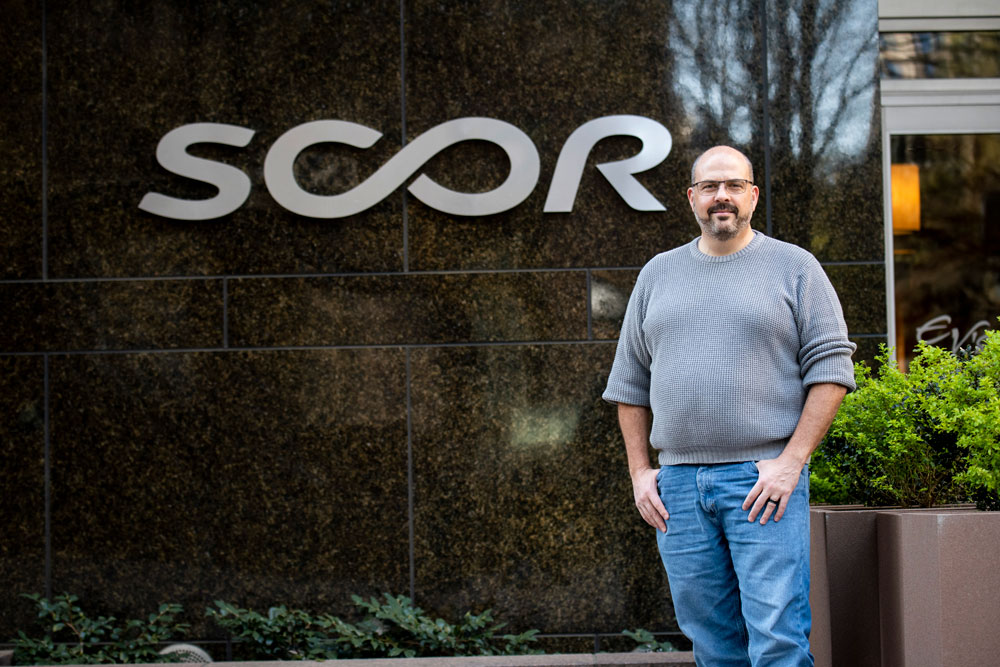- FR
- EN

Learning what matters for a successful career
Al Mele, A letter to my younger self
Letter to my Younger Self
Dear Younger Self,
It’s me… I mean, you… 30 years from now. I have this opportunity to share back to you a few things from the future. So, let’s start with the important stuff… Enjoy your hair – it won’t last long.
But seriously, I’m a different person than I was 30 years ago. I guess if you don’t learn something over the next three decades, you’re doing something wrong.
Right now, you’re fresh out of college, and where you thought you’d be using your math degree as a teacher, you’ve found yourself in software testing in the insurance field – a field you never thought twice about. (Maybe if you had, you’d have known what an actuary was and supplemented that math degree with an actuarial focus.).
Your career will continue to take turns you never imagined while in school – moving from software testing to software development, design and managing. Your habit of questioning “why” and learning about the business your software supported led to business responsibilities – starting with helping customers get onboarded to that same software and growing into responsibility for a department dedicated to underwriting innovation.
As you learn more and your interests change, your focus shifts to how teams work together. You’ll learn that a great team is more than just great people – it’s focusing those people on a clear objective that they care about and building an environment in which they can collaborate courageously.
Understanding what goes into such an environment probably took me longer to learn than anything else. Here are the highlights I wish someone had told me at the beginning of my career, and which might have shortened that learning curve.
Relationships matter. When you know someone and understand their intentions because you have a strong relationship, a lot of potential obstacles never materialize, and a lot of constructive connections you never expected do materialize. It took me years to realize that relationships can accomplish what logic and data alone cannot. Also, you never know when your provider from two years ago will end up as your boss… It really is a small world. Stay connected.
Communication matters. I know, I know – you’re a “fact” guy, not a “tact” guy. But you can (and should) find a way to give candid feedback in a way that encourages people to consider it, and not provoke defensiveness. It will make you (and them) more effective, and it helps tremendously with relationships. Honestly, right now you’re a bit of a jerk, and when you fix that, you’ll realize the difference it makes.
Results matter. You’re going to hit low points where it feels like only image matters or “politics” – but it will pass. In the end, results matter most. Always have a clear vision of your goals, and a clear strategy for achieving them. Persevere through the low points. Don’t forget to celebrate the wins.
Never stop learning. Don’t wait for someone to teach you. Don’t ever think you have nothing more to learn. Be self-aware enough to know what your weaknesses are and focus on improving them. The ability to learn and adapt is more important than any single narrow focus of expertise.
Never stop improving: Some mistakes are inevitable, but they are also valuable learning experiences. Be open to learning from these and owning them instead of excusing them or deflecting them. Try never to make the same mistake twice. Take some time to reflect on what works and what doesn’t work. It may seem like you don’t have time for that, but in the long run, you don’t have time not to!
Group intelligence outweighs individual intelligence: You will work with a lot of brilliant people over the course of your career. A lot of brilliant people will also work for you. Make sure they understand that their voice is welcomed and help them use their initiative and creativity. The concept of psychological safety is a powerful one, and the sooner you encounter it, the sooner you’ll understand what it takes to get the most out of the people you lead.
I know you’re a skeptical person, and I recommend you keep that questioning spirit – but with an open-mindedness that allows you to change your mind when it’s the right thing to do. It took me a long time to figure some of this out, and if I can help you shorten that learning curve, you’ll come to appreciate it.
Regards,
Future You
P.S. – in May of 1997 a company called Amazon is going to go public. It’s an “electronic bookstore”. I know it seems like a weird idea, but if you can scrape together a few grand to invest, we’ll both appreciate that!
P.S.S. What does all this mean for you, reader? You’re a different person with different experiences and different lessons to learn. But if you, like the younger me, can benefit from any of the things I’ve learned over my career, I’m happy to share my experience with you.
Who is Al Mele?

Al Mele started his career in Information Technology, where he worked as a software engineer in life insurance illustration software. He joined SCOR in September 1999 as a programmer/analyst working on reinsurance administration systems.
He is now the Global Head of Agility for SCOR, using his previous experience leading Underwriting Innovation teams in the US Life market to help the organization deliver predictably, efficiently, and transparently.
Al is a graduate of the University of North Carolina, Chapel Hill, a Certified Scrum Product Owner (CSPO) and Certified Scrum Master (CSM).
Related articles
Letter to my Younger Self
Lessons in self-confidence, volunteering, taking time, and not pleasing everyone
September 16, 2024

